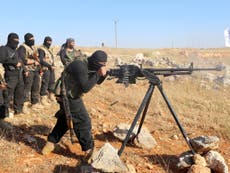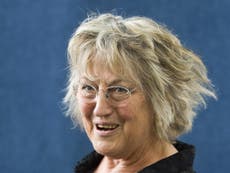Show me the jihadist with a well‑thumbed copy of Middlemarch in his back pocket
It seems the majority of graduates recruited into Islamist terrorism studied sciences, not arts


In the certain knowledge that it will irk those for whom life is one long dreary struggle against unacceptable attitudes, I repeat a favourite jeu d’esprit of mine. If we doubt the power of literature and art to civilise, how come no one has ever been mugged by a person carrying a well-thumbed copy of Middlemarch in his back pocket?
Those tantrum-tweeters to whom this defence of a liberal education is preposterous, and who cite Beethoven-loving Nazis to prove it, have yet to put their money where their mouths are. Fine, I say, you believe the well‑read are as capable of brutality as anyone else, but tell me in that case when you were mugged by someone carrying a well-thumbed copy of Middlemarch? And even if perchance you were, you liars, I bet the mugger didn’t take your library card.
It’s important to my argument that the mugger who never was isn’t just carrying a copy of Middlemarch but has read it several times, written notes in the margin, loved this chapter, hated that, and engaged critically with the whole. For the mere act of buying a book and leafing through it isn’t what humanises us. Take Raskolnikov, who we can be sure read more than was good for him. Today, before killing the old woman, he’d have attended a book group. And this much I will concede to those who argue against the civilising power of literature: listening to other people complaining over warm merlot and cold lasagne that a novel isn’t about them can make a murderer of anyone.
It’s not the being bookish that saves us from barbarism, and it isn’t even that education of the sympathies that Middlemarch provides: it’s the questioning, the wondering, the doubting, the refusing, the arguing, the discovering thoughts and feelings you never knew you had because you never had them, and the jettisoning of them the minute they become familiar; it’s the restlessness of reading when we are not passive recipients of language but partners in its equivocations, its leaps and gaps and contradictions, its marvellous refusal, when in the service of art, to believe finally in a word it says.
Whoever has once been truly unsettled by a work of the imagination will never give loyalty to a single idea, belief system, religious faith or party. When demagogues and dictators ban art, this is the reason: art is the great solvent of obedient fundamentalism. You can imprison but you can’t enslave a man who argues with his books.
Which brings us, as all roads must, to the threat posed by jihadists. Paul Vallely, that excellent writer on matters spiritual and religious, asked a pertinent question last week. “What kind of person becomes a jihadi terrorist? Specifically, what kind of educated person?” Not, please notice, what makes a person become a terrorist. We all know the answer to that. Tony Blair. And in the case of terrorists who predated Tony Blair, then Israel, America and the Imperialist West. What makes a person become a terrorist? Reader, you and I do. Since it’s so easy for us to make a terrorist, you might wonder why we don’t promptly go ahead and unmake him. A thought I am content to leave you with.
Vallely is exercised by a different question: if an education is meant to humanise, how come, in the case of educated jihadis, it doesn’t? And here’s his intriguing answer. “The overwhelming majority of graduates recruited into Islamist terrorism studied engineering, science and medicine. Almost none are social science or arts graduates.”
The basis for this assertion is Immunising the Mind, a study carried out for the British Council – a recommendation that will cut no ice, I realise, with those who hold the council’s colonialist exportation of the poems of Robert Browning and Dorothy Wordsworth to be a further incitement to jihadi terrorism. Its author, let it be said, is not dogmatic about his findings; he simply presents the evidence and wonders. Wonders if “embracing violence” might be “connected to education in certain subjects failing to encourage the questioning of received ideas or alternative arguments or points of view”. Wonders if there might not be a particular “mindset which is attracted to the simple solutions and lack of ambiguity, nuance or debate sometimes seen in technical subjects – and that is vulnerable to radicalisation for similar reasons”.
It is not his, or indeed my, intention to speak slightingly of a technical education. We need bridges, and engineering does not, of itself, make a jihadist. The real question is whether a degree in English literature might deter him. Apparently afraid of such an eventuality, Isis has, according to the study, “eliminated law, fine arts, archaeology, philosophy and political science from curricula in areas it controls”. Might this, then, be our way of fighting back? Instead of bombing the caliphate, should we be dropping copies of Middlemarch?
Alternatively, we could try bringing a little nuance and ambiguity to the debate ourselves. If every effect has a cause, we would do well to ask whether the violence of the language we employ: the jeering, the trolling, the irrational name-calling – denominating this one a warmonger, charging that one with genocide – doesn’t itself contribute to the atmosphere of animosity in which we live.
In our own little caliphate of intolerance, every day brings another call to ban or boycott someone we happen not to agree with, no matter that the offendee is a member of a profession – boxing, show business, presidential politics – from which gentle suasion is not to be expected. In a novel, contrarieties enhance; we grow mentally the more apparently antithetical views we hold. But on the streets and on the internet, contrarieties face one another with an implacable loathing. Ignorance is dangerous enough, but when ignorance is clothed in the assertiveness of certainty – not just being certain but loving certainty’s snarling exhilaration – it is murderous.



Join our commenting forum
Join thought-provoking conversations, follow other Independent readers and see their replies